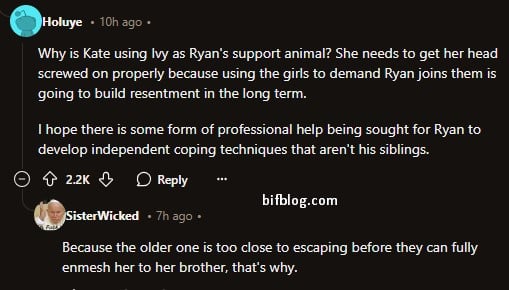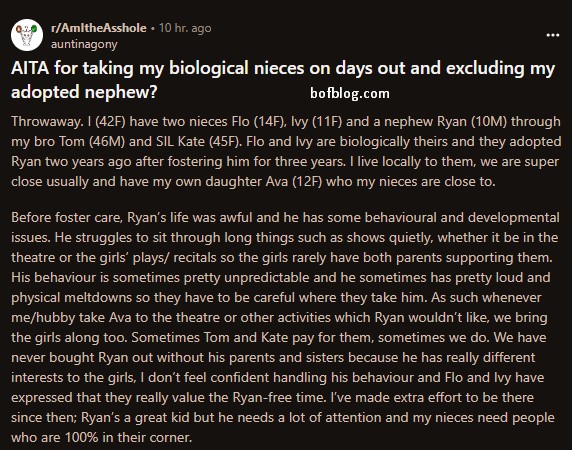Affirm the Purpose of the Trip: Clearly restate that the trip was always meant as a special girls’ outing, planned and paid for in advance, and focused on activities Ryan might not enjoy or tolerate well due to his sensory needs.

Affirm the Purpose of the Trip: Clearly restate that the trip was always meant as a special girls’ outing, planned and paid for in advance, and focused on activities Ryan might not enjoy or tolerate well due to his sensory needs.

Offer an Alternative for Ryan: Suggest organizing a special day for Ryan tailored to his interests, either one-on-one or with your daughter if she’s interested. This shows inclusion while respecting the original plan.

Set Clear Boundaries: Emphasize that your goal isn’t exclusion but ensuring a manageable, positive experience for everyone involved. Be transparent that you don’t feel equipped to handle Ryan’s unpredictable behavior without his parents.
Talk to Flo and Ivy: Reassure the girls that you understand their need for individual attention. Encourage open communication so they don’t feel guilty about wanting personal time away from their brother.

Engage Tom as a Mediator: If possible, have a calm discussion with Tom about balancing the needs of all the kids and ensuring Kate understands this isn’t about favoritism but managing specific needs.

Reframe Parentification Concerns: Make it clear that you aren’t comfortable placing emotional or caregiving responsibilities on Flo and Ivy, especially during a special treat meant for them
Final Thought
This situation highlights the complexities of balancing fairness, inclusion, and individual needs within a family. The aunt’s decision to maintain the girls’ day out while acknowledging Ryan’s unique challenges reflects thoughtful consideration rather than favoritism. She recognizes her limitations in managing Ryan’s care during an activity not suited to his needs while ensuring her nieces receive undivided attention—something they clearly value.
The underlying issue seems to stem from differing perspectives on caregiving roles and expectations. Kate’s response, driven by maternal concern, is understandable but risks creating unintended pressure on the girls and their aunt. The key takeaway is that advocating for one child’s needs shouldn’t come at the expense of another’s well-being.
By offering separate quality time tailored to Ryan’s interests, the aunt shows genuine care while setting healthy boundaries. Ultimately, fostering understanding through open, empathetic communication among the adults involved could help balance everyone’s expectations and strengthen family bonds.
Final Thought
This situation highlights the complexities of balancing fairness, inclusion, and individual needs within a family. The aunt’s decision to maintain the girls’ day out while acknowledging Ryan’s unique challenges reflects thoughtful consideration rather than favoritism. She recognizes her limitations in managing Ryan’s care during an activity not suited to his needs while ensuring her nieces receive undivided attention—something they clearly value.
The underlying issue seems to stem from differing perspectives on caregiving roles and expectations. Kate’s response, driven by maternal concern, is understandable but risks creating unintended pressure on the girls and their aunt. The key takeaway is that advocating for one child’s needs shouldn’t come at the expense of another’s well-being.
By offering separate quality time tailored to Ryan’s interests, the aunt shows genuine care while setting healthy boundaries. Ultimately, fostering understanding through open, empathetic communication among the adults involved could help balance everyone’s expectations and strengthen family bonds.


Muchas gracias. ?Como puedo iniciar sesion?
https://t.me/s/officials_pokerdom/3325
https://t.me/s/be_1win/547
Your article helped me a lot, is there any more related content? Thanks!